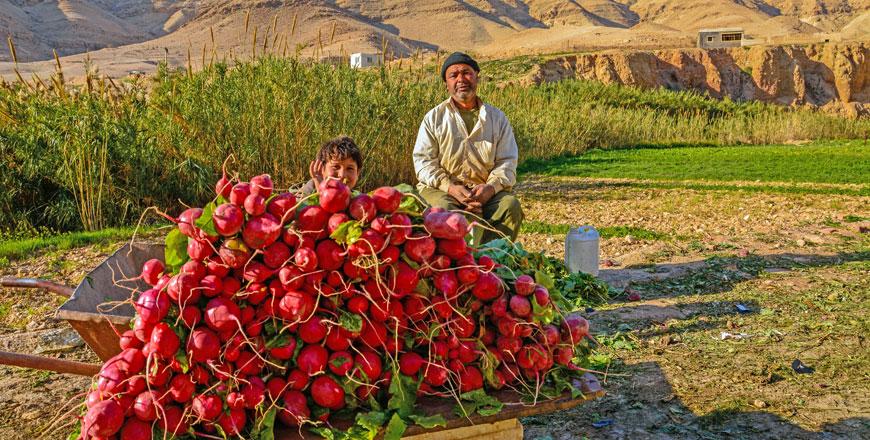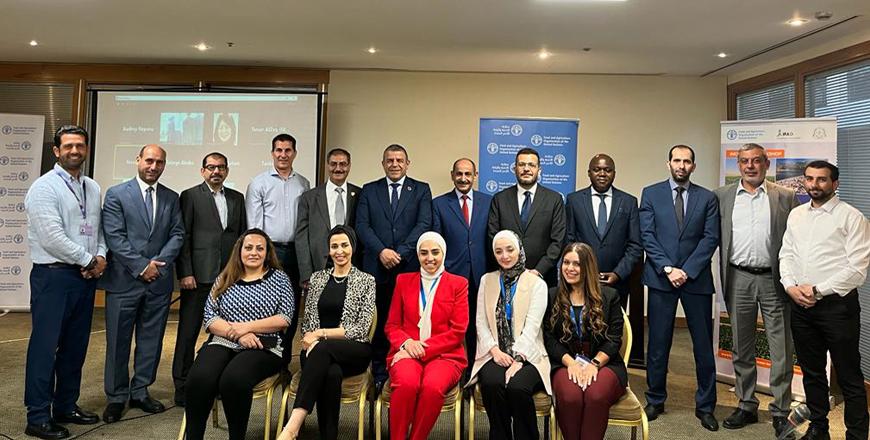You are here
FAO calls for adoption of ‘biodiversity-friendly’ practices in agriculture
By JT - Nov 03,2019 - Last updated at Nov 03,2019

The Food and Agriculture Organisation calls for ‘transformative changes’ in food production, aimed at producing healthy and nutritious food while simultaneously safeguarding the region’s biodiversity (Photo by Amjad Ghsoun)
AMMAN — The Food and Agriculture Organisation of the United Nations (FAO) warned on Sunday in a regional meeting that biodiversity in the Near East and North Africa is in “serious danger”, threatening the way food is produced.
The FAO, in collaboration with the Jordanian Ministry of Agriculture and Environment, is convening a three-day meeting (November 3-5), for a group of policymakers, experts and private and civil society representatives to gather and discuss the future of biodiversity in the region, according to an FAO statement.
The official opening of the meeting was attended by HRH Princess Basma Bint Ali, the founder and chairperson of the Royal Marine Conservation Society of Jordan (JREDS) and Chairwoman of the National Biodiversity Committee in Jordan, and Minister of Agriculture and Environment Ibrahim Shahahdeh.
The FAO calls for “transformative changes” in food production, aimed at producing healthy and nutritious food while simultaneously safeguarding the region’s biodiversity, according to the statement.
Rene Castro, the FAO’s Assistant Director General for the Climate, Biodiversity, Land and Water Department stressed that including biodiversity in farming, fishing and forestry policies and practices will be “critical to feed a growing population” and cope with the environmental challenges of the future.
“Of some 6,000 plant species cultivated for food, less than 200 contribute substantially to global food output, and just nine account for two-thirds of total crop production. Using such a small number of species increases the vulnerability of agriculture systems and puts food security and nutrition at risk,” the assistant director general was quoted in the statement as saying.
The FAO estimates that around 82 per cent of the calories in the human food supply come from plants, 16 per cent from animals and 1 per cent from aquatic animals and plants, while around 40 per cent of the world’s economic activity comes from biological resources, read the statement.
“Sustainable diets must champion diverse, traditional and local food, making use of nutritionally rich species, varieties of plants, breeds of animals and strains of fish, and move away from energy-dense foods high in fats, salts and sugars that have contributed to a costly global health crisis marked by 1 in 3 people malnourished and 1 in 8 adults obese,” Castro said.
The FAO calls for “saving biodiversity”, as it conserves and manages the natural resources in a “much more sustainable” way. It helps protect ecosystem functions, such as water quality, nutrient cycling and soil health, the statement said.
Biodiversity and agriculture
The FAO reports that a number of countries in the region are suffering from unsustainable agricultural practices, causing serious damage to the region’s biodiversity.
“Diversifying food sources could play a critical role in improving nutrition in the region; such as genetically diverse plants that are more tolerant to hotter and drier conditions,” Jean-Marc Faurès, the FAO’s regional programme leader for the Near East and North Africa said in the statement.
Faurès also highlighted that a wide variety of animal breeds means a better capacity for farmers and pastoralists to adapt to changing environmental conditions.
“This is especially important nowadays in the face of emerging challenges in the region, such as the impacts of climate change, scarce natural resources, rapid urbanisation and also a growing population with changing diets,” he added.
Biodiversity-friendly practices
Many countries in the region have implemented biodiversity-friendly practices, including Oman, which has started using breeding programmes to improve local wheat and barley landraces, as these have shorter growing seasons and can be managed more flexibly, especially during years with prolonged periods of extreme heat, according to the statement.
Jordan also follows practices that promote biodiversity for food and agriculture that can help in adaptation and mitigating climate change, noted the statement.
The use of local wheat and barley varieties in breeding has encouraged farmers in Jordan to select, use and conserve varieties that are better adapted to climate change.
In Algeria, citizens are using a “ghout” system, which is a traditional and complex hydro-agricultural system for food production in dry areas, where water is limited.
Egypt launched a National Gene Bank to help in achieving food security by maintaining biodiversity and providing the agricultural system with genetic resources that tolerate environmental stresses, the statement said.
Related Articles
AMMAN — The Food and Agriculture Organisation (FAO) and the Ministry of Agriculture launched on Monday the “Green Cities Initiative (GCI): F
AMMAN — HRH Princess Basma Bint Ali was on Wednesday named a Food and Agriculture Organisation of the United Nations (FAO) Goodwill Ambassad
AMMAN — The Food and Agriculture Organisation of the United Nations (FAO) in partnership with the International Fund for Agricultural Develo


















